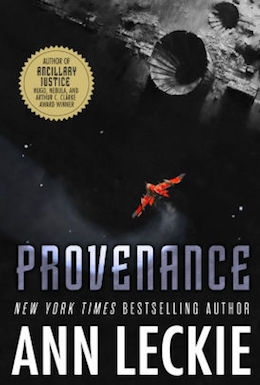It is difficult for me to write this review without simply gushing READ THIS NOW. (But seriously: read this now.)
It’s true that I have been a fan of Ann Leckie’s work since first reading Ancillary Justice, and that Ancillary Sword and Ancillary Mercy only deepened my appreciation for Leckie’s ability to tell a story. The Imperial Radch trilogy impressed a lot of people, as witnessed by the array of awards and award nominations it took home. But after such a successful debut—after such a lauded debut trilogy—there is always going to be a question when the author moves on to something new. Can the next book live up to the quality of what has gone before while breaking new ground? Or will they spend their career telling different versions of the same story?
The answer, in Leckie’s case, is Provenance, which is every bit as good as her previous work and very different in theme, tone, and approach. Provenance takes place in the same universe as the Ancillary books, but outside the Radchaai sphere of influence. Hwae is a small planet-nation of limited importance to anyone except its inhabitants and near neighbours. Unlike the Radchaai, the people of Hwae have three genders (and consequently three sets of pronouns, she, he, and e) which young people choose between as one of the signs they have become adult. Hwaeans ascribe immense social and cultural importance to relics, which play a significant (and legitimating) role in their culture and politics. Those politics revolve around important families (and/or the very wealthy) who periodically must run for election. People in these families frequently adopt or foster children from less-well-off crèches, but it seems that only one child can inherit their parent’s name and position. This is certainly the case when it comes to Ingray Aughskold’s mother, Netano Aughskold. In order to impress her mother and show up her elder brother, Ingray has come up with a brilliant plan. A plan so brilliant it doesn’t go off the rails until oh, just before Provenance begins.
Ingray paid to get a criminal out of prison, on Tyr Siilas station, in order that she can convince said criminal to tell her where e put the Hwaean relics that e was convicted of stealing. (Her plan did not include any inducement for e to tell her other than “asking nicely.”) Unfortunately, the criminal arrives in a suspension box—essentially in stasis—which she did not expect. She further did not expect Captain Uisine, the ship-captain she hired to get her and her cargo home, to refuse to take a person who isn’t awake anywhere without them being woken up and asked if they were quite all right with being shipped off to strange places. And she certainly didn’t expect the person who wakes up from suspension to completely deny being Pahlad Budrakim, the criminal who’s central to Ingray’s plan.
Oops.
This is where the complications begin. Murder, fraud, and an obsessive ambassador from the alien Geck (one of the few Geck ever to leave the Geck home system) who believes that Captain Uisine’s ship was stolen from the Geck and refuses to be persuaded otherwise all come into play. So does a political dispute among Hwae’s neighbours, which is about to spill over—is in fact in the process of spilling over—onto Hwae itself.
Ingray is a delightful main character. (And a very different one from Breq.) Ingray is really quite a young adult, with the grasp of second- and third- order consequences commonly found among first-year undergraduates. Ingray makes many of her plans, at least at first, based on the assumption that people will act in the way that she imagines they will act. When they don’t—when they react to Ingray in a completely different fashion—Ingray is frequently left scrambling to catch up, bereft of a backup plan, until she stumbles across something that works (more or less), or is backed up by her ability to make friends—or at least find people who feel sympathetically inclined towards her—in unusual places.
The Geck are interestingly strange, and have a very different social organisation than any of the human societies Leckie has written about to date in the Imperial Radch universe. (The only Radchaai in the book is the ambassador to the Geck. An ambassador in a posting she never wanted, that no one cares about, to a people who mostly ignore her. She’s kind of hilariously rude and give-no-fucks: she wants to go home and drink tea, but that’s not going to happen for her.)
As Ingray convinces the person she thought was Pahlad to work with her to at least embarrass her brother, she learns that Pahlad can’t lead her to the relics. E can only tell her a truth about them which, if it got out and was proven, would have a destabilising effect on Hwaean society.
Of course, then the people with guns happen.
Part coming-of-age story, part murder mystery, part political thriller, and part exploration of questions of memory, meaning, and cultural identity as represented by physical relics of the past, Provenance is an extraordinarily good book. Tightly paced and brilliantly characterised—as one might expect from Leckie—with engaging prose and a deeply interesting set of complicated intersecting cultures, it is a book that I loved, and one that I expect to read again.
It’s remarkably fun, really good, and has a strikingly satisfying conclusion. Very well recommended.
Provenance is available September 26th from Orbit Books.
Liz Bourke is a cranky queer person who reads books. She holds a Ph.D in Classics from Trinity College, Dublin. Her first book, Sleeping With Monsters, a collection of reviews and criticism, is out now from Aqueduct Press. Find her at her blog, where she’s been known to talk about even more books thanks to her Patreon supporters. Or find her at her Twitter. She supports the work of the Irish Refugee Council and the Abortion Rights Campaign.










